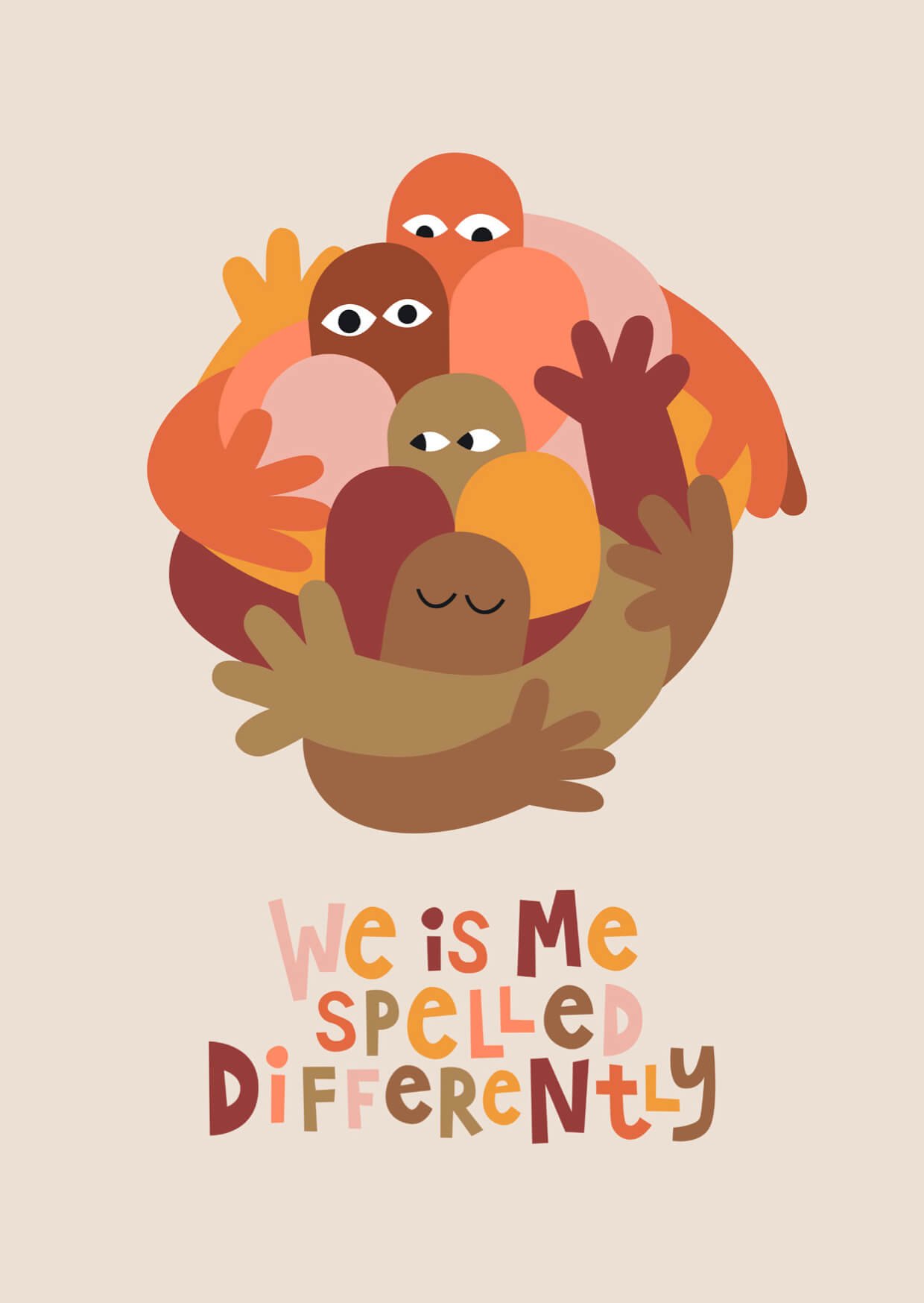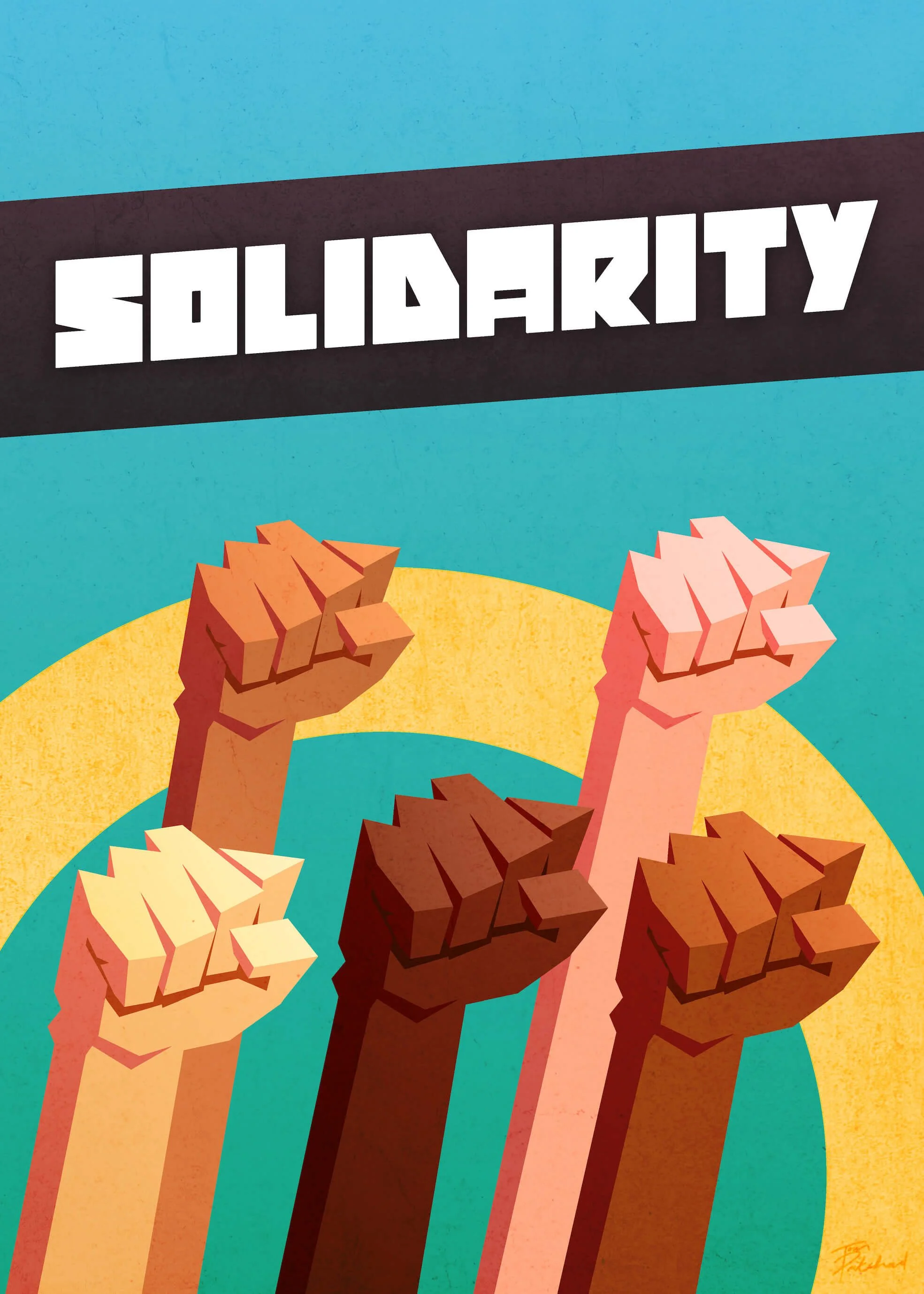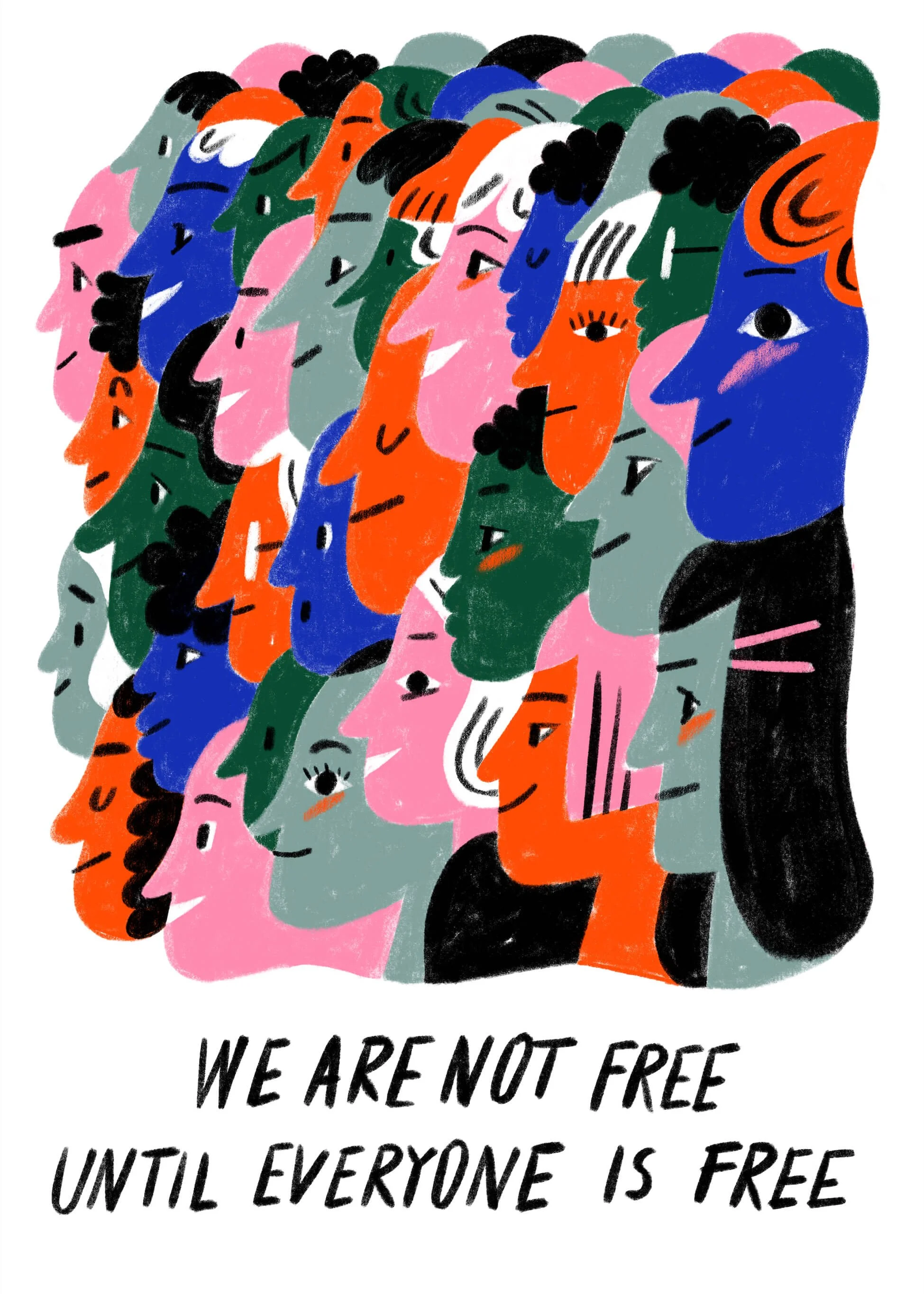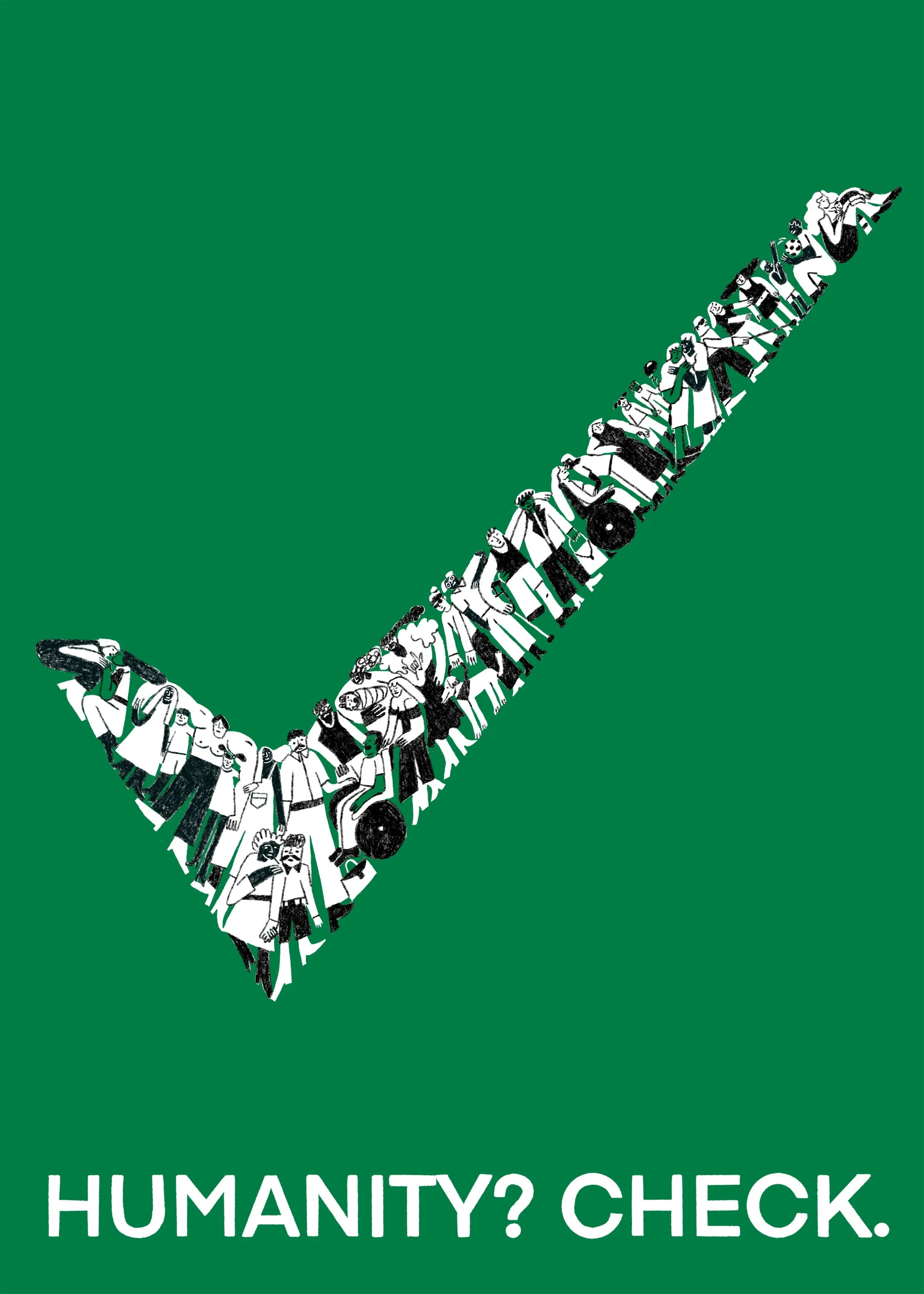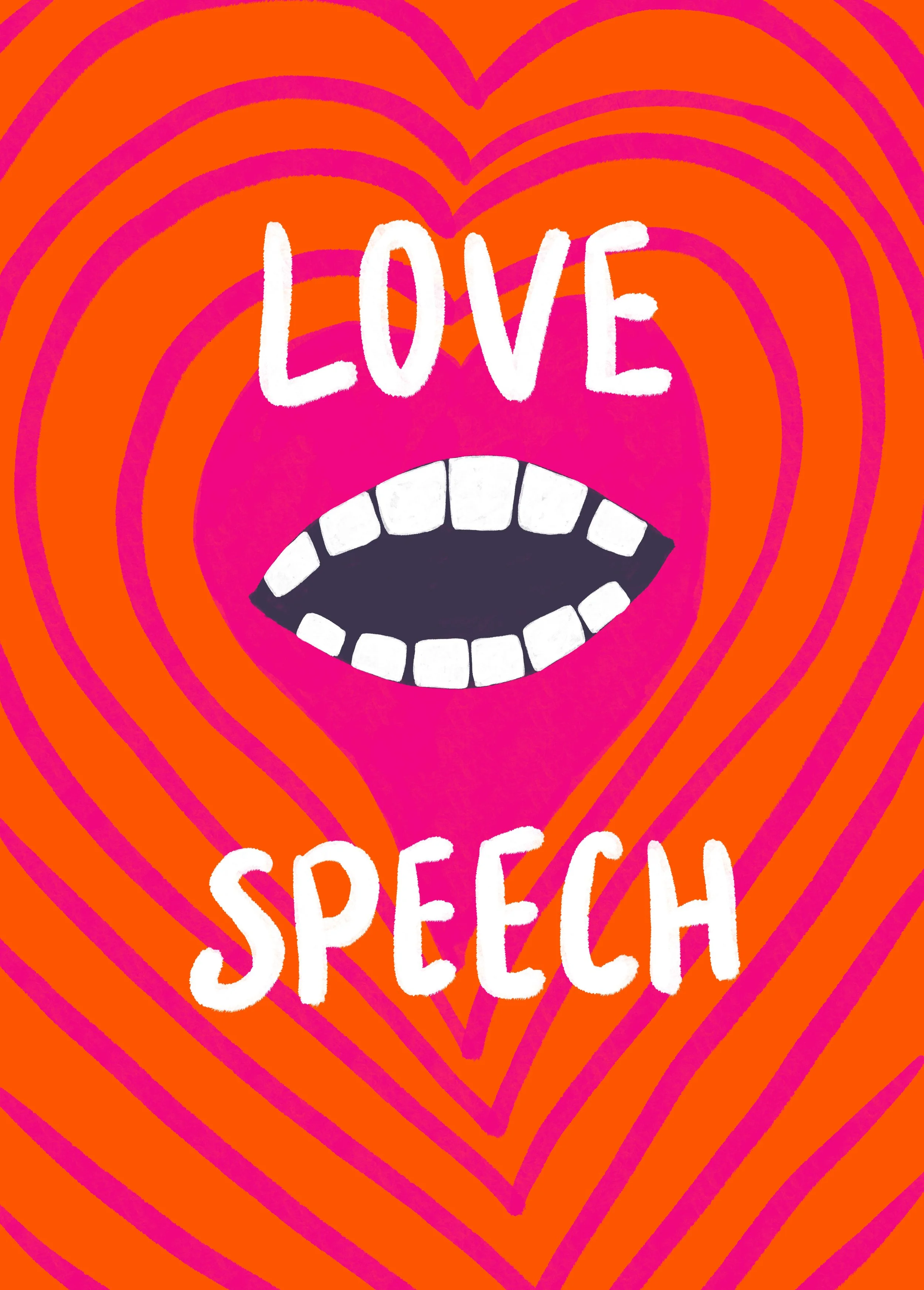No more nonprofit heroes
Stories about heroes and victims, saviours and people who need saving are everywhere in the nonprofit sector. All these stories add up to create a ‘them and us’ narrative.
Are you part of a ‘them and us’ narrative?
You might be, if you answer yes to some of the questions below.
I’ve done all of these myself, many times. I’m really not trying to shame anyone. Just to point out the impact that our stories have.
Do you…
Talk generally about the people your charity supports?
You’re vague about who they are, what they need, and why.
If your charity is international, you might be extra vague about where they are ('on the ground', 'in the field' or 'in the global South').Talk precisely about the people who donate to, volunteer for or work for your charity?
No blanket terms here, just specific stories, names and details.Portray service users as passive?
Maybe you call them 'beneficiaries' or 'recipients of help.'Tell people’s stories for them?
Instead of letting them tell their own story in their own way.Let donors shape how you talk about issues?
Not the people you serve.Stay silent on systemic oppression?
Because talking about racism, ableism, classism, cissexism (and oh so many other -isms and forms of oppression) in your nonprofit might scare donors.Move location instead of tackling deep power dynamics?
You can move your headquarters away from Brussels/Geneva/London, and bring White Supremacy culture (PDF) along with you.Blame people – however subtly - for being marginalised?
You might call them 'hard to reach' or 'hard to engage' groups.Reduce people to a few keywords?
‘We need a refugee story for World Refugee Day, but not a queer asylum seeker because we could feature them in Pride month, and not a girl because we could use her story for International Day of the Girl.’Celebrate ‘lived experience’ without rewarding it?
Calling someone an 'expert by experience' or telling them they’re irreplaceable doesn’t give them power. If you don’t pay them or give them meaningful decision-making powers, they’re not enjoying ‘expert status.’Have staff, trustees and volunteers who don’t have life experiences in common with the people you work for?
Maybe your staff, trustees and volunteers tend to be rich and relatively privileged. Maybe the people you work with are living in poverty, maybe they’re working class, disabled, or systemically marginalised in some other way. There’s a lack of shared experience.
Sound familiar?
These are just some of the ways we create and sustain a ‘them and us’ narrative. That narrative makes:
inequality look natural and fixed.
systems of oppression invisible. In reality, systems like racism, classism, ableism (and other -isms) are created and run by people. We can change them.
alternatives seem impossible. It says we can tweak the balance of power slightly, but the world will always be split into ‘them’ (who charities exist to serve), and ‘us’ (who tend to work for, volunteer for or be a trustee for charities). Two separate groups.
‘We is me spelled differently’ by Alex Tait, part of the Reimagining Human Rights project shared under the Creative Commons licence.
How to change the narrative
This article suggests some practical actions you can take. I’ve grouped them into five sections:
1. Get clarity
Figure out what stories you’re telling, and what narratives they play into.
2. Think narratively
Look at communications, governance, operations - everything - as part of your organisational narrative.
3. Change the system
Make structural changes, not just small adjustments.
4. Focus on language
Changing our words alone won’t dismantle oppression, but it can nudge our thoughts, beliefs and behaviours.
5. Build solidarity
Don’t just chuck solidarity into a list of brand values. Solidarity means doing.
‘Solidarity’ by Tom Pritchard, part of the Reimagining Human Rights project shared under the Creative Commons licence.
Hear from the experts
So how can we take action? I spoke to these brilliant people, to find out how:
Martha Awojobi, CEO of JMB Consulting and curator of #BAMEOnline,
Lena Bheeroo, anti-racism activist and international development professional,
Jon Cornejo, anti-racism consultant and activist,
António Ferreira, mental health activist
Collette Philip, founder of social justice brand consultancy, Brand by Me,
Ruth Taylor, narrative strategist
Penny Wilson, CEO of Getting on Board,
Get clarity
‘Charity communications like social media, direct marketing and email, are where a lot of the harm is done’ says Lena Bheeroo. ‘Communications is where we can fix a lot of the damage too.'
To fix the damage, you need to figure out what stories you’re telling.
Take stock
‘It’s often said “you don’t know, what you don’t know'’ says Collette Philip, founder of social justice brand consultancy, Brand by Me. ‘So when organisations are trying to understand how their storytelling fuels or props up systemic inequity and injustice, it’s really important to take a step back and audit what stories you’re telling at the moment.
“A simple content audit is not enough. It’s about active listening.”
‘Listening to what minoritised groups are saying about your content (rather than dismissing them as naysayers, or ignoring them because they are not 'experts'). Listening for the untold histories that are absent in your comms, because they don’t make for easy reading, or simple soundbites. And finally, looking with a jaundiced eye at your content, to actively surface inequity (in content or practice), colonial or saviour narratives and tales of us versus them.
‘It’s not easy – and given my opening sentence, this needs to be done in partnership with, not on behalf of people from minoritised groups. So you probably can’t do it alone (which is why this is a core part of our work at Brand by Me)!’
Think narratively
Narrative is more than words. It shows up across what you say and where you say it and who you trust to say it and who gets credit for saying it.
If you want to think narratively, you need to see storytelling and narrative as an intervention, just as concrete as a campaign or a service.
Once you know what stories you’re telling, it’s time to change them.
“We dream in narrative, daydream in narrative, remember, anticipate, hope, despair, believe, doubt, plan, revise, criticize, construct, gossip, learn, hate and love by narrative.’”
Narrative change can be complex, and this article addresses it only in simplified terms. For a nuanced treatment of narrative change, check out reports like The Features of Narrative from Frameworks Institute, Toward New Gravity by Narrative Initiative, and Transforming Narrative Waters by Ruth Taylor.
Change for the right reasons
Don’t change your communications just to look progressive. (If that’s your motivation, it won’t work anyway).
“Stories make, prop up, and bring down systems. Stories shape how we understand the world, our place in it, and our ability to change it.”
Do it because stories underpin narratives, and narratives underpin social dynamics. Stories influence what we think is possible. Change the story, and one day we can change how we see change itself - who can change social systems, how they can unlock change, why they do it, who should care about it.
“Social movements must also have their own narratives if they want to contest power and shift dominant narratives that shape our societies”
See communication as action
‘In the communications/brand/content team, we just transmit the messages. Someone else decides them.’
I hear this a lot. It’s not usually true. It can be a convenient story that we use to present ourselves as powerless, and sidestep our obligations.
Communication is action. That doesn’t mean performative tweeting is enough to move things forward. It’s not enough on its own. But It means that communication is part of change. Creating, shaping, rephrasing and promoting messages are interconnected activities, and they should all be taken seriously.
If you identify as a powerless communicator of someone else’s messages, that’s probably all you’ll be.
‘We are not free until everyone is free’ by Anina Takeff, part of the Reimagining Human Rights project shared under the Creative Commons licence.
Change the system
Depersonalise criticism
If you get called out, try not to make it about yourself. If you act like a victim, when you actually have the power to make change, your victimhood may be violent. We don’t need any more White women’s tears, we need accountability and openness to change.
Try not to identify as a do-gooder
‘We see ourselves as good people because we do good work’ says Jon. ‘And that is key to the whole mindset across the charity sector. So then when we talk about mistakes, when we talk about microaggressions, when we talk about anything at that sort of level, it can feel that we're being told we're bad people. There is a real tendency that we take being called out as a personal attack of some sort, and it's really not.’
Hanna Naima McCloskey, CEO of Fearless Futures, writes in a LinkedIn post about victimhood and purity, ‘If we really understand how systems of oppression manifest - we would recognise that we are all implicated to varying degrees in their reproduction. Systems of oppression create the conditions where perpetuating harm is actually likely.’
This doesn’t have to be a big deal. Some people are more oppressed than you. It’s likely they:
don’t care about how guilty you feel, and
just want you to take concrete action.
Put most of your energy on action, not self-blame.
Welcome constructive criticism
Of course you’ll get things wrong. If you get called out, there’s no need to feel ashamed, or defensive or burst into tears.
Thank the person who’s called you out; they think you can do better and they’ve taken the time to help you. Listen. Reflect. Commit to doing better. Make a plan.
Accept risk
We should worry about making some mistakes, like harming the people we work with. These are broadly avoidable. But other risks are unavoidable. We will:
say something that someone doesn’t agree with,
attract the attention of trolls who want to derail and distract us,
be drawn into the Culture Wars by hostile media.
You can’t eliminate risk, only manage it. So be deliberate about which risks you run. Angering some trolls? That’s scary, but you might just need to do it.
Be bold
When I’m creating justice, equality, diversity and inclusion policies or statements with my clients, the first draft tends to be bold. It’s often a radical vision of the world we want. Then worries will come in. Someone’s concerned about how this phrase might play with donors. Someone else recalls that another charity was attacked for saying less. Could we soften the part about White Supremacy? Could we say ‘diversity’ instead of anti-racism?
This is how our stories lose power. When we polish our communications to reduce PR risk, we buff away its radical potential.
Statements that sound breezy and upbeat will look nice on your website. They’ll probably delight your least marginalised staff members. But they likely won’t do anything to shift power. Focus on action, not aesthetics.
Learn in the open
Don’t change your language as a cheat code to woke-wash your organisation. Use it to learn in the open.
‘We've seen some charities like the National Trust and the Joseph Rowntree Foundation being very honest and open about the legacy they are built on, and about the backlash that they've received’ says Lena. ‘Obviously, it puts off other charities as well and it becomes a risk. But what's the risk to not be doing this stuff, to not changing your language and actually showing that you're progressing? Really the unseen effect of this is the continued harm on people of colour in the sector.’
Change who tells stories
Hire people who’ve experienced the relevant issues. If your team doesn’t include anyone with lived experience, you have a ‘them and us’ problem.
Refugee Action is (at the time of writing) hiring for a communications and engagement officer with experience of being a refugee or person seeking asylum. (Under current rules, people who are seeking asylum typically can’t work but people who’ve been granted refugee status can work).
Image description: a job advert for a communications and engagement officer at Refugee Action. The role has been ring-fenced for those with lived experience of being a refugee or person seeking asylum.
Don’t edit people’s stories
We’re used to writing about the people our charities serve. We collect quotes and case studies, align them with our voice, tone and brand, proofread, edit, package and repackage them.
Instead of interviewing people, then polishing their words to fit your expectations, why not let people tell their own stories? No edits.
‘Contributors express a desire to have their voices heard, choose what stories are told and if possible, tell their own stories because, as the Niger proverb goes, 'a song sounds sweeter from the author’s mouth' - Putting the Contributor Centre Frame.
For ideas around how to hand over storytelling to the people most affected by the issues you work on, check out Who Owns The Story? by Jess Crombie and David Girling.
Gather content with care
An image can make a person look dignified, even if the process of making it was exploitative. A case study can use inclusive language, but it can distress and exploit the person featured.
“Ethical communications is as much about process as outcome. ”
Charities (especially international development charities) are increasingly thoughtful about the entire process of gathering people’s stories and images, thanks to research like The People In The Pictures by Jess Crombie and Siobhan Warrington. But we still have room to improve.
Some people think the sector just needs to start telling uplifting and dignified stories, instead of sad stories or poverty porn. Jess Crombie, writing in Putting the Contributor Centre Frame, calls this the ‘the circular and unhelpful “negative/positive imagery” debate.’
The reality is more nuanced. Sometimes people want to tell stories that are negative. They usually don’t want this to be the only story that’s told, so balance and accuracy are still vital. But we can’t make a rule to always create hopeful images or always select uplifting quotes. If we do that, we’re treating people as passive beneficiaries.
Focus on process
As Jess writes, ‘the locus of human “dignity” [is often thought to reside] in the image itself. However, the locus for addressing dignity should move beyond the image-making process toward the recognition that a contributor makes to the process as a stakeholder. This shifts the focus from an imperative to remove images of suffering, to focusing on how we include the contributor in the process of telling their own story.’
That might mean choosing not to tell people’s stories, even though they might raise money. Or having someone else tell that story, even though they’re not the most likely to arouse sympathy (like choosing an adult man rather than a photogenic child).
Put people before profit
In Who Owns The Story?, AMREF tested out two different approaches to fundraising. One was contributor-led, and one was NGO-led. The contributor, Patrick, created content that’s more authentic, original and unexpected. Patrick’s story raised the most money.
But we should be careful not to draw sweeping conclusions from this.
“Don’t pass the mic to your contributors because you think it will raise more funds.”
There’s a parallel here with the misunderstood and misused business case for diversity. ‘The mechanisms by which diversity creates value are far more complicated than what most people understand’ writes diversity, equity and inclusion consultant Lily Zheng. ‘In other words, the business case for diversity only appears after hard work to transform its many costs into benefits, hard work that few companies are actually willing to do.’
If you grudgingly give your contributors control over their stories, specifically so they will raise you more money, you’re instrumentalising them. Their stories might raise more funds. But without genuine autonomy, they may not be able to tell genuinely authentic stories. Don’t treat autonomy as a hack.
Jess and David end Who Owns The Story? with this excellent reminder:
‘To anyone reading this and wondering whether it was a success because Patrick was special and a brilliant undiscovered communications talent, we want to say put the idea aside immediately. Anyone, whether as near as your local shop, or as far as a plane ride away, will have a story to tell. And, because they are the ones who have lived through the event or situation they are describing, they will tell it fully and with the nuances and contexts that help humanise us all.’
Work together
When Barnardo’s talked about White privilege, or the National Trust talked about colonialism and enslavement, many supporters reacted with anger and outrage.
It’s understandable if we’re terrified of bad publicity or supporters cancelling their donations. But being attacked can also make us bolder. Research by the Sheila McKechnie Foundation found that attacks on charities have backfired, making many of us more likely to speak out on injustice.
Let’s try to give and get more support from our partners and peers. Perhaps your charity could agree shared messaging, create more joint campaigns for solidarity, or be the first to respond with a message of support when they’re unfairly attacked.
Take a collective view on long-term impact
‘Narrative change is always a collective effort’ says Ruth Taylor, author of Transforming Narrative Waters (read my previous article for Ruth’s excellent definition of stories versus narratives).
‘No one organisation can achieve it alone.
‘Organisations who are committed to social and environmental justice can become more than the sum of their individual parts through recognising the shared deep narratives on which all their work sits. A deep narrative of individualism, for example, affects nearly every social and environmental cause you can think of.
‘Organisations should reflect on the ways their work further embeds or reinforces harmful deep narratives, and how it could better serve the strengthening of alternative, progressive narratives, for the success of their own cause, but also other causes far removed from their own in policy terms.’
So even if individualistic messaging works in the short-term for one fundraising campaign, in the long term it can damage our sector, and damage people’s ability to imagine future change.
Try to bring in long term and collective thinking into your decision-making. Perhaps you could take inspiration from laws that make policymakers consider the wellbeing of future generations, like Wales’ Wellbeing of Future Generations act. Could you introduce a version of this at your nonprofit, but for the collective health of our sector?
‘Humanity? Check’ by Rozalina Burkova, part of the Reimagining Human Rights project shared under the Creative Commons licence.
People don’t need ‘humanising’
'We tell people’s stories with the intention of 'humanising people'’ says Martha. ‘It reveals that we don’t think that they exist on the same plane as us. We need to go even further back than what words are we using. Ask: why are we telling these stories? Why are these words even on our lips?'
If telling someone’s story won’t advance justice and equality, why would we do it? Perhaps it’s better to have someone else tell their story. A different story from the one you had in mind. Or leave the page blank.
Decentre donors
'We need to stop elevating donors above other vital components, including staff, volunteers, boards, and especially the people most affected by systemic injustice that we’re supposed to be helping and working with to undo inequity’ writes Vu Le.
That means institutional donors, and individual givers, too.
In some areas, donors are used to having enormous control. They can dictate what content gets collected, what stories are told and in what formats. But it’s the contributor who should decide, not the funder. Whenever possible, we should push back against the demands of donor love.
‘We don't have that external pressure coming from regulators and the government and donors to change our sector like we did in safeguarding’ says Lena (referring to the sexual exploitation safeguarding scandal). ‘We are trying to progress things internally in the sector in organisations. But there is a disconnect between that and the public, and what the public has been sensitised to for years and what they see charity as. There is something to be done there about bridging that gap to help them to understand and to help them be more open to the idea that it should be done in a different way ‘We also can’t underestimate that the public are moving with us on the whole narrative change, to moving to a more equitable sector.’
Decentre money
I get it. Our sector is barely resourced. Of course we need the money.
But does getting more money always help? It doesn’t mean you create more justice. You can spend a lot of money on services that marginalise people and increase inequality.
'I don’t care if it would make as much money. I’d rather progress justice and equity’ says Martha.
Be willing to lose authority
If we break down the ‘them and us’ narrative, we will lose some of the old certainties.
'It’s going to mean that some people who had expert status will not be able to keep it’ writes Rashad Robinson.
I’ve been in lots of meetings where I am the least informed person in the room. I’ve been asked to speak about topics I don’t know anything about, then had people listen respectfully. I’m White and middle class, but you guessed that already.
“Many of us enjoy ‘expert’ status for reasons that don’t have to do with expertise. ”
Do we have the knowledge and skills our sector actually needs? If so, we’re likely to keep a seat at the table.
But we need to reckon with the possibility that we aren’t needed, that we’ve been taking up space when other people were much better equipped to do our roles.
Slow change
We’ve inherited centuries-old narratives.
The first charities in the UK date from the sixth century. They’re enmeshed in the history of the church, schools and our moral imaginations. And they helped to invent and perpetuate ideas of the ‘deserving poor.’ Read my last article, on the origins of the charity sector, if you’re curious.
These stories run deep. It won’t be quick or easy to unlearn them.
‘We are closer than we think’ by Ed Dingli, part of the Reimagining Human Rights project shared under the Creative Commons licence.
4. Focus on language
Find new phrases
'When you’re used to hearing a term, it desensitises you' says António Ferreira, mental health activist. 'So because I've used BAME so much, I never ever thought of using other words. Because I've heard service user so much. I've never ever thought it in any other light than a service user. But we need new words and phrases.'
Don’t try to sound slick
Capitalism tells stories to mystify the inequality it creates. It creates differences (like the invention of race as a cultural concept) to suggest that inequality is natural.
“Dismantling oppressive structures in our language will sound weird, ugly. It’s not going to roll off the tongue. ”
'White supremacy will try and repackage things back into the boxes of white supremacy’ says Martha. ‘It stops being liberatory.
Our words will sound both weird and true. Keep saying them until they just sound true.
“We need to get comfortable with saying things that feel and sound weird and uncomfortable. Stop being so boring. Stop being so predictable. Be more brave.”
Be specific
Humanitarian teams are not ‘on the ground’ or ‘in the field.’ They are in Ethiopia, England or Ukraine. Named places in named countries.
Vague blanket terms erase difference. They play into narratives about where in the world disaster should strike and where it shouldn't, people who should be safe, and people who shouldn’t.
Be accurate
We inherit phrases and sometimes use them unquestioningly.
The phrase 'hard to reach’ implies that someone is the problem; it’s them that is too hard to get to.
When we blame people for their own exploitation, we’re pushing an ahistorical and apolitical understanding of inequality. We imply that poverty or illness are the product of ‘unfortunate’ historical accidents, individual failures or coincidence. But they’re the product of economic, political and legal systems design.
People don’t just happen to be marginalised, they become marginalised by the way society designs them out of power.
What if we called people:
need to reach,
under-estimated (thank you Penny Wilson and Dowshan Humzah for sharing this one!)
or - this one’s painfully accurate - easy to ignore?
Make duty bearers visible
Using the passive voice makes duty-bearers invisible. It hides them from responsibility.
Oppression happens because people make it happen. For more examples of how passive voice implies that injustice is an accident, see my previous blog on the ‘them and us’ narrative.
Avoid ‘getting’ or ‘using’
'I hate the word 'benefits' says António. 'People ask me “what 'benefits' do you get from being disabled? Do you get a disabled badge? Oh you're so lucky.” But that’s not accurate. You are getting the bare minimum you deserve for the experience you are facing. To others, mention benefits, and they automatically become inattentive to the traumatic experiences you faced.’
‘When you think about the phrase service user' says António, 'even the word user can sound bad. You can take away service and it sounds bad. User has very rarely been attributed to something positive, like when we talk about drugs. Not everyone wants to admit to being a service user. There’s two sides to the story: there is still some logic to ‘service user’ but it doesn’t mean we shouldn’t question it.’
Let’s strip language about 'getting' from our vocabularies. Let’s also reconsider figurative language about ‘using’ resources. It can activate fear of scarcity and selfish thinking, as we worry that people are ‘using up’ or, taking more than they should. In reality, the people who are usually accused of taking more than they deserve are the ones who have been given the least.
Label the issue not the person
'It’s better to label the systemic issue than to label the person' says Martha.
❌ Avoid: making it all about identity, for example, talking more about people of colour than about racism, or talking more about displaced people than about the processes that displaced them.
✅ Consider saying: people who experience racism and sexism (instead of women of colour) or people who survived state-sponsored violence (instead of displaced people).
Sometimes, the way we talk about discrimination can put the focus on the wrong person. You could say ‘people who face -isms.’ (I first heard this from Kimberley at Junxure), to show that the issue isn’t the person’s identity, it's the social systems built up around them and designed to oppress them.
Ask people
You don’t get to decide how to talk about someone else’s identity.
If someone wants to keep the focus on being Black (rather than on anti-Black racism) because being Black is a source of pride, joy and celebration for them, then I don’t get to say ‘actually I think you should call yourself someone who experiences anti-Black racism.’ Obviously.
You can’t demand that an autistic person calls themself a person with autism, or a disabled person says person with disability. It’s not up to you.
Ask people. Then respect what they tell you.
‘We are one’ by Olga Mrozek, part of the Reimagining Human Rights project shared under the Creative Commons licence.
Challenge donor/beneficiary paradigms
‘Beneficiaries’ came joint top in an informal Oxfam poll to find the most hated international development sector jargon. It’s not hard to see why.
As Jess Crombie writes in Putting the Contributor Centre Frame (part of the You’ve Been Reframed series):
‘The term “beneficiary” is one that describes a purely one-way interaction - those that passively receive rather than those that actively engage. If, as many NGOs claim, we as a sector are seeking to create a future of partnership with those we seek to help, we may want to consider using terminology that befits the intrinsically two-sided nature of partnerships to help nudge cultural as well as practical change.’
It’s not accurate, because we work in partnership.
Accurately describe people
In a 2015 article, Renee Ho suggests constituent should replace beneficiary. Renee writes:
‘A beneficiary passively receives what its benefactor gives it.
A constituent authorises what aid and philanthropy can do.
A beneficiary is not empowered to control what affects it.
A constituent can affect decision-making.
A beneficiary’s voice is not heard in aid and philanthropy.
A constituent’s voice is that around which the ecosystem is organised and oriented.’
I love this! It’s exactly the relationship I’d like to see between nonprofits and the people the work with.
That said, I don’t support constituent - or any other word - as a blanket alternative to beneficiary. Some people may support it, others won’t.
We can’t slap another label on people without first finding out what they want. If you decide how people should be identified, you are making them a passive beneficiary. Even if the name you give them is super progressive.
We should ask, listen to, and work with people to decide what language to use. If you want to suggest some words or phrases, here are a few ideas:
❌ Avoid saying: beneficiaries, recipients.
✅ Consider saying: People in our movement, people who share our beliefs, people united around our cause, people we’re supporting to achieve their goals, people we exist to support, people who’ve experienced oppression, people who’ve been marginalised, people who experience [named issue], people affected by [named issue], participants, our community, co-actors, co-workers, partners, clients, customers, constituents, citizens or co-liberators.
My favourite is co-liberators. If we’re working together for collective liberation, isn’t it the most accurate?
Watch out for the consumer construct
I haven’t listed consumer in the list of suggestions above, although it’s a common alternative to beneficiary, especially in co-designed projects.
Jon Alexander, author of Citizens, urges us to reposition ourselves as #CitizensNotConsumers.
‘The term consumer matters because it’s an identity construct. It contains coded within it an idea of who we are, and what the right thing is for us to do. Every time we use it, we are telling ourselves that what is right is to seek the best possible deal for ourselves from the options offered, based primarily on material self-interest, as narrowly defined individuals, and for the short term.’
Accurately describe the work
‘Rather than having one more powerful group ‘giving’ and the beneficiary ‘receiving’, we need to say this is actually an equitable partnership’ says Lena. ‘We need to recognise both parties bring something really valuable to the same table. ‘Working with’ feels much better than ‘working for.’
❌ Avoid saying: helping, saving, giving.
✅ Consider saying: Working with, working alongside.
Accurately describe location
When people have power and status, we tend to talk about them in specific language. When people are seen as less powerful or lower status, we tend to generalise about them.
I’m not talking about concealing someone’s location for safeguarding reasons, which is obviously non-negotiable. I’m talking about dividing the world into ‘specific places we know and care about’ and then ‘all the other places.’
Watch out for vague, homogenising terms like ‘on the ground’ (How are you any more ‘on the ground’ in one place than in another? Do we not have ‘ground’ in the UK?) or ‘in the field’ (what exactly are you harvesting?)
If you wouldn’t call a project ‘fieldwork’ when it happens in Australia or the USA, don’t say it about Angola or Uruguay.
Bond’s brilliant language guide, Taking British politics and colonialism out of our language, calls out ‘on the ground’ as being both colonial and militaristic, and ‘locals’ as being generic. Instead of ‘colleagues who work on the ground’, it suggests saying ‘colleagues who work with communities.’
❌ Avoid saying: on the front line, in the field, locals, in country (you can just name the country).
✅ Consider saying: in [exact location]. Name the region, country, district or exact town/city/village, if appropriate. Be as specific as you can, unless there is a safeguarding reason to keep someone’s location (or any other details) private.
Describe other people like yourself
Vague descriptions of life in other countries and regions can serve to set the limits of who is considered a full human, and who’s less than. There’s no finer example than How to Write about Africa by Binyavanga Wainaina.
If you find yourself treating your own context as a proper place full of proper people, consider this tip from Deborah Doane (quoted in Duncan Green’s article about devspeak horror words):
‘My 16 year old son is looking to achieve a “sustainable livelihood” for half-term in Peckham. If any local “stakeholders” have any opportunities for this “beneficiary” please get in touch. It could be “transformative” and even “empowering.” Would you use this phrase to describe something in your own life? If not, then why use it elsewhere?’
When you lose the meaningless jargon, generalisations and vague umbrella terms, it’s more inclusive. It’s also just better writing.
‘Love speech’ by Milena Filipova, part of part of the Reimagining Human Rights project shared under the Creative Commons licence.
5. Build solidarity
When a nonprofit delivers food, hygiene supplies, educational materials, training, or technical resources, we often call it help. But advocating for the rights of people who experience oppression is only help if you see your struggles as disconnected. If it’s part of a shared project, it’s solidarity.
Solidarity, not help
‘Solidarity is not the same as support’ said bell hooks. ‘To experience solidarity, we must have a community of interests, shared beliefs and goals around which to unite.
“Support can be occasional. It can be given and just as easily withdrawn. Solidarity requires sustained, ongoing commitment.’ ”
There’s a quote you may know as attributed to Lilla Watson (more on that later).
‘If you have come here to help me, you are wasting your time. But if you have come because your liberation is bound up with mine, then let us work together.’
No heroes, no victims
Hero stories, like the White saviour trope, run through the nonprofit sector. They are part of the story we tell ourselves about how inequality is unfortunate, but that good people do good deeds to fight it.
Hero stories are part of the problem. So there’s no room for individual heroes in the solution.
Let’s go back to that quote attributed to Lilla Watson.
‘If you have come here to help me, you are wasting your time. But if you have come because your liberation is bound up with mine, then let us work together.'
There’s a guiding message here for how charities talk about our work.
Lilla Watson doesn’t want to be credited as the author of the quote. Watson was part of an Aboriginal Rights group in Queensland in the 1970s. They came up with the phrase together.
Watson’s discomfort being labelled as the source of the quote is instructive. She doesn’t see herself as the sole owner of this idea. No one person can take credit for a collective achievement.
Our movements are shared
If we’re going to take apart the 'them and us' story in the nonprofit sector, we can’t be individual heroes.
“International solidarity comes from the belief that our livelihood is interdependent on each other, and that none of us are free until all of us are free.”
As Chimamanda Ngozi Adichie says, ‘Racism should never have happened and so you don't get a cookie for reducing it.’ You don’t get a gold medal for unpicking oppressive systems that shouldn’t have existed in the first place.
There are no individual prizes, just collective liberation.
Want more stories like this?
